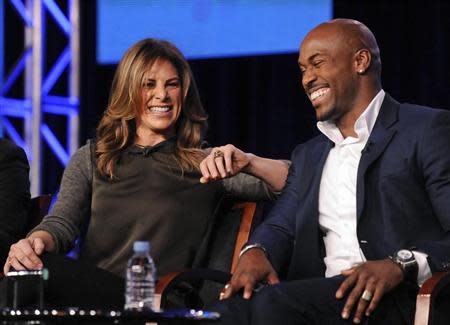‘Biggest Loser' trainer says fitness a mental and physical process

By Dorene Internicola NEW YORK (Reuters) - As celebrity trainer Dolvett Quince challenges and prods obese, unfit contestants to slim down and shape up on the weight-loss TV show "The Biggest Loser" he also uses survivor skills acquired during his childhood to boost their self esteem. The Los Angeles-based trainer said getting fit is a mental as well as a physical challenge. He can identify with the struggles of his outsized team because as an adopted child he was mentally and physically abused and has experienced his share of self doubt. "I walked into an environment where education was low and discipline was high," said Quince, 40, who was born in Stamford, Connecticut. "I understand what it's like to feel defeated and because I faced my own demons I can empower others." Quince said fitness for people who are 100 pounds (45kg) or more overweight, involves a lot more than pushups. "Health is a four-point component: emotional, physical spiritual and mental," said Quince, whose best-selling book, "The 3-1-2-1 Diet: Eat and Cheat Your Way to Weight Loss - Up to 10 Pounds in 21 Days," was published last month. The fitness coach, who began his career at the YMCA where his clients included the elderly, mothers, teenagers and children, tries to chip away at people's personal doubts and past disappointments. "People become extremely vulnerable as their bodies fatigue and they're going through transformations. It's in that vulnerability that the concrete cracks and some light pushes in," he said in a phone interview. Karate, yoga, hiking and basketball are included in his fitness regime. At the gym he suggests combining cardio training, usually running on a treadmill, with strength training to systematically target different muscle groups. "Doing intervals keeps your body guessing," he explained. Lauve Metcalfe, a wellness coach and past president of the International Association for Worksite Health Promotion, believes shows like "The Biggest Loser" can raise public awareness about the importance of fitness. But she has concerns about the rapid weight loss, often 10 pounds a week or more, expected of contestants. "A pound and a half per week is a healthier goal," said Metcalfe, who is based in Tucson, Arizona. "And the aspect of every week getting on that scale, and the shame if you haven't met (the goal), is a negative," Quince attributes his success in helping people get in shape to his refusal to take no for an answer. "I think people don't necessarily truly love working out," he said. "I think it's more like, ‘Man, must we work out? Can't we just have a drink?" His job, he added, is to instill belief as well as to motivate people to move. (Editing by Andrew Hay)
